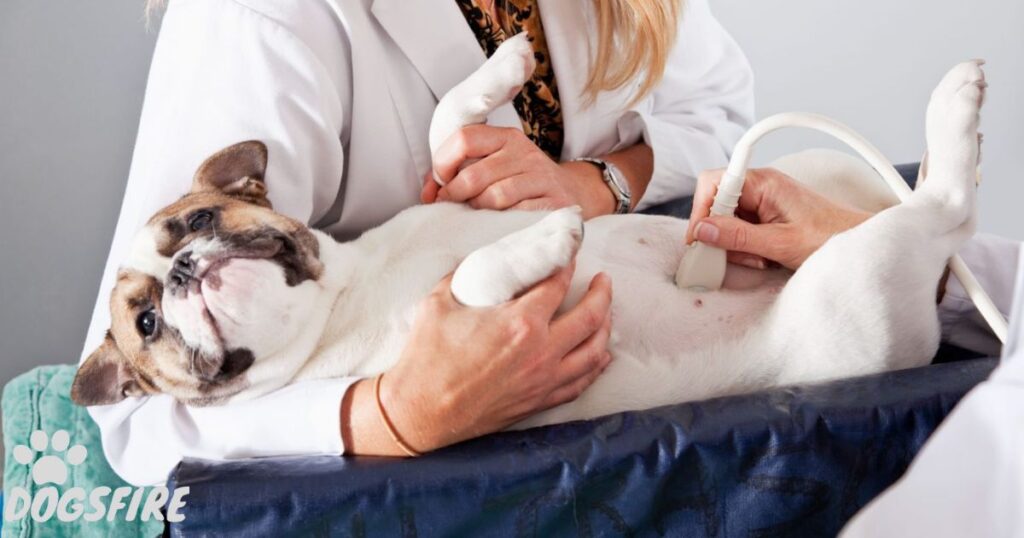French Bulldogs pregnant means that a female French Bulldog is expecting puppies. During this time, the dog undergoes a gestation period of about 63 days. Proper care, nutrition, and veterinary attention are crucial to ensure a healthy pregnancy and delivery for both the mother and her puppies.
Hold those tiny treasures close, for they’ll steal your heart instantly. Delve into the world of How Long Are French Bulldogs Pregnant to ensure proper care and a healthy litter. These adorable dogs carry their pups for about 63 days. Learn about the special diet and attention needed during this crucial stage of your pet’s life.
These are pregnant for about 63 days, or approximately 9 weeks. During this time, they require proper care and attention to ensure a healthy pregnancy. It’s essential to monitor their diet, provide regular veterinary check-ups, and create a comfortable environment for the expectant mother.
What are the first signs of a French bulldog pregnancy?

The first signs of a French bulldog pregnancy can include changes in behavior and appetite. Around three weeks after conception, you might notice your Frenchie becoming more affectionate or seeking extra attention. Additionally, some pregnant French bulldogs may experience a decrease in appetite or show signs of morning sickness.
Physical changes also become apparent, such as nipple enlargement and a slight weight gain. As the pregnancy progresses, you may feel small, firm lumps in the abdominal area, which are the developing puppies. It’s crucial to monitor these signs and consult with a veterinarian for proper care and guidance during your French bulldog’s pregnancy.
Physical changes in the dog
The bulldog undergoes physical changes as it grows. As a puppy, it is small with soft, wrinkled skin. As it matures, the bulldog’s body becomes more muscular and sturdy. Its coat may change color or pattern over time. The face develops distinctive wrinkles, and the characteristic pushed-in nose becomes more pronounced.
Bulldogs also experience changes in weight and size, with adults being heavier and more solidly built than their puppy counterparts. These physical transformations contribute to the unique appearance of the bulldog as it transitions from a cute puppy to a robust and distinctive adult dog.
Behavioral changes
The bulldog’s behavior can change over time. Factors like age, environment, and health can influence these changes. Bulldogs are known for their calm and friendly nature, but they may become more relaxed or less active as they age.
Changes in routine or surroundings can also impact their behavior. It’s important to observe and understand your bulldog’s behavior to provide appropriate care and attention. Regular vet check-ups can help address any health-related behavioral changes. Overall, a bulldog’s behavior may evolve, and attentive owners can ensure a happy and healthy life for their furry companions.
French Bulldog pregnancy calendar

Week 1 (days 0 to 7)
It’s a week of first steps and fresh starts. Each day brings opportunities to learn and grow. Challenges may arise, but they are met with determination. The journey of the week is marked by progress and adjustment. It lays the foundation for what lies ahead. Week 1 is a chapter of exploration and adaptation, setting the tone for the days to come.
Week 2 (days 7 to 14)
The Each day brought new opportunities and challenges. People worked hard and learned more. Goals were set, and progress was made. The week was a mix of ups and downs, but everyone stayed determined. As it ended, there was a sense of accomplishment and anticipation for the weeks ahead.
Week 4 (days 21 to 28)
The final stretch of the month. As we approach the end, reflect on your accomplishments and set new goals. Use this time wisely to complete any pending tasks and prepare for the upcoming month. Take a moment to celebrate your achievements and plan for continued success in the weeks ahead.
Week 5 (days 28 to 35)
Covering days 28 to 35, marks the final stretch of the month. It’s a significant time when routines and habits established earlier begin to show results. As the week unfolds, reflection on achievements and setting new goals become essential for personal growth. Whether in work or personal life, Week 5 is an opportunity to wrap up the month with a sense of accomplishment and readiness for what lies ahead.
Week 6 (days 35 to 42)
It marks the ongoing journey of the seventh week. During this time, various activities and experiences unfold. People may find themselves settling into routines or encountering new challenges. As the days progress, individuals often reflect on their accomplishments and set goals for the upcoming weeks. It’s a pivotal time in a longer journey, providing opportunities for growth and self-discovery. Whether it’s work, studies, or personal endeavors, Week 6 brings a mix of challenges and achievements, shaping the path forward.
Week 7 (days 42 to 49)
It’s a crucial phase where routines settle in. By now, habits formed earlier become more natural. You may notice progress in tasks undertaken during this time. It’s a good opportunity to reflect on achievements and set new goals for the upcoming weeks. Consistency is key during Week 7. Stick to your plans and maintain a positive mindset. Whether it’s work, study, or personal goals, keep moving forward. Celebrate small victories and stay motivated for the journey ahead.
Week 8 (days 49 to 57)
In this period, we continue our journey through the weeks, approaching the two-month mark. The days are filled with various experiences, challenges, and opportunities. As we move forward, we reflect on the progress made so far and set new goals for the upcoming days. Week 8 brings a sense of accomplishment and the anticipation of what lies ahead. It’s a time to stay focused, motivated, and make the most of each day as we navigate through this eighth week.
Week 9 (days 57 to 65)
It was a busy and eventful period. Each day brought new challenges and opportunities. From Monday to Wednesday, we focused on project deadlines, collaborating to meet our goals. Thursday was a day of reflection and planning for the upcoming week. Friday marked the end of the workweek, and we celebrated small victories. The weekend allowed for relaxation and recharge, preparing us for the final stretch of the week. As we reached day 65, a sense of accomplishment and anticipation for the next week filled the air. Overall, Week 9 was a dynamic journey with its highs and lows, contributing to our growth and progress.
How many months is the pregnancy of a dog on average?
The pregnancy of a dog, also known as gestation, typically lasts around 63 days. Unlike humans, dogs have a relatively short pregnancy period. During this time, the expectant mother undergoes various physical changes to accommodate the growing puppies. It’s important for dog owners to provide proper care and nutrition during the pregnancy to ensure the health and well-being of both the mother and the developing pups.
Once the gestation period is complete, the dog enters the labor phase, and the puppies are born. It’s essential to be attentive to the needs of the mother and the newborns during this critical time. Regular veterinary check-ups and a supportive environment can contribute to a smooth and healthy pregnancy for the dog and a successful start for the new canine family.
Factors Affecting Pregnancy Duration

Several factors can influence the duration of pregnancy in Bulldogs. The age of the bulldog plays a crucial role, with younger dogs often having shorter pregnancies. The health of the bulldog is also vital; well-nourished and physically fit dogs tend to have more regular pregnancies. Genetics contribute to pregnancy length, as certain breeding lines may have predispositions.
Environmental factors, such as stress and living conditions, can impact pregnancy duration. Adequate prenatal care, including regular veterinary check-ups, can positively affect the length of the pregnancy. Overall, a combination of age, health, genetics, environment, and proper care determines the duration of pregnancy in Bulldogs.
Health of the mother
The bulldog is crucial during pregnancy. Regular vet check-ups ensure she is in good condition. A balanced diet with proper nutrition supports her well-being. Adequate exercise helps maintain her fitness. Monitoring for any signs of discomfort or complications is essential.
Providing a comfortable and stress-free environment contributes to a healthy pregnancy. Early detection and prompt veterinary care address any health concerns, ensuring a smooth journey for the mother bulldog and her puppies.
Size and age of the dog
Bulldogs come in various sizes, ranging from small to medium. The typical height for an adult bulldog is around 12 to 16 inches at the shoulder. In terms of weight, they generally range from 40 to 50 pounds. Bulldogs usually reach their full size by the age of one, but their weight can continue to fluctuate slightly as they age. Despite their compact size, bulldogs are known for their muscular build and distinctive wrinkled face, making them a unique and charming breed.
Preparing for Pregnancy
Preparing for a French Bulldog’s pregnancy involves careful planning and attention to the mother’s well-being. Before breeding, ensure that both the male and female French Bulldogs are in good health. Schedule a visit to the veterinarian for a pre-breeding health check, including vaccinations and screenings for any potential genetic issues. It’s vital to choose a suitable mate with a compatible temperament and health history to promote healthy offspring.
During pregnancy, provide the pregnant French Bulldog with a balanced and nutritious diet. Consult the veterinarian to determine the appropriate food and supplements. Create a comfortable and quiet space for the expectant mother to rest and prepare for the delivery. Keep a close eye on her behavior and consult the vet for regular check-ups to monitor the pregnancy’s progress. Being proactive in preparing for a French Bulldog’s pregnancy contributes to the well-being of both the mother and her future puppies.
Providing proper nutrition
Giving your bulldog the right nutrition is crucial for their well-being. Bulldogs have unique dietary needs, and it’s important to choose a high-quality dog food specifically designed for their breed. Monitor their weight to ensure they maintain a healthy size.
Bulldogs can be prone to allergies, so selecting food with limited ingredients may be beneficial. Regular meals, with appropriate portion control, contribute to their overall health. Fresh water should always be available. Consulting with your veterinarian for personalized dietary advice can ensure your bulldog receives the proper nutrients, promoting a happy and active life.
Creating a comfortable environment
It for your bulldog is crucial for their well-being. Provide a cozy bed or mat for them to rest, as bulldogs love to nap. Ensure the space is not too hot or cold, as they are sensitive to extreme temperatures. Bulldogs appreciate a quiet and calm atmosphere, so consider minimizing loud noises.
Regular exercise is essential to keep them happy, so designate a play area. Keep their water bowl filled, and provide nutritious meals to maintain their health. Groom them regularly, as bulldogs can have skin folds that need attention. By making their surroundings comfortable and attending to their needs, you’ll foster a happy and content bulldog companion.
Potential Complications Common Issues During French Bulldog pregnancies
French Bulldog pregnancies can sometimes face potential complications. One common issue is dystocia, where the dog struggles during labor, and assistance may be needed. This can occur due to the breed’s unique body shape and the puppies’ relatively large heads. It’s crucial for owners to monitor the progress of the labor closely and seek veterinary help if needed.
Additionally, French Bulldogs may be prone to complications like pregnancy toxemia or eclampsia, which involve metabolic imbalances and require immediate veterinary attention. Regular prenatal check-ups and a well-balanced diet can help minimize these risks and contribute to a healthier pregnancy for French Bulldogs. Owners should also be aware of the possibility of cesarean sections being necessary for French Bulldog deliveries.
Due to their compact build, natural births can be challenging, and veterinarians may recommend cesarean sections to ensure the safety of both the mother and the puppies. It’s important for owners to collaborate closely with their veterinarians, follow recommended prenatal care guidelines, and be prepared to address any potential complications promptly for a successful and safe French Bulldog pregnancy.
How to address complications
During your French Bulldog’s pregnancy, act promptly by seeking veterinary assistance if labor shows signs of distress. Be prepared for the possibility of a cesarean section due to the breed’s unique anatomy.
Regular check-ups help identify issues early, and if symptoms like lethargy or seizures arise, consult the vet immediately. Creating a calm environment during labor is crucial for a successful outcome. Quick and attentive responses can contribute to the overall health and well-being of the mother and her puppies.
How to Prepare for Labor and Delivery
Seek guidance from your vet on managing the labor and delivery of your French Bulldog’s puppies. Given the challenges French Bulldogs face during natural mating, a natural birth poses risks due to their small hips and the puppies large heads.
Rely on your veterinarian’s expertise to determine whether a vaginal birth is suitable or if a C-section is necessary. In many instances, a C-section is the safest and most common method for French Bulldogs, with approximately 80% undergoing this procedure.
If your vet approves a natural birth, ensure the whelping box is arranged to your Frenchie’s liking, providing her with a comfortable space. Monitor her temperature regularly to anticipate labor, and be attentive to signs like pacing or digging. Respect her space during this preparation phase to ensure a smooth and safe birthing experience.
How to Care For Your French Bulldog Afterward

After your French Bulldog gives birth, it’s crucial to provide attentive care for both the mother and her puppies. Ensure they have a quiet and comfortable space, commonly referred to as a whelping box, where the mother can nurse and bond with her offspring. Keep the environment warm and draft-free to safeguard the delicate newborns.
Support the nursing mother with a nutritious and easily digestible diet to aid her recovery and milk production. Regular veterinary check-ups for both the mother and puppies are essential to monitor their health and address any potential concerns. As the puppies grow, gradually introduce them to puppy food while continuing to provide a secure and clean living space.
Be observant of the mother’s behavior, ensuring she remains stress-free and has ample time for rest. By offering proper post-birth care, you contribute to the well-being of the French Bulldog mother and her adorable pups.
FAQ, s
How often do French bulldogs go into heat?
Female French Bulldogs typically go into heat, or estrus, twice a year. The heat cycle lasts for about 2 to 3 weeks. It’s crucial for owners to be aware of signs such as increased affection, swollen vulva, and changes in behavior during this time.
French Bulldog pregnancy temperature?
During a French Bulldog’s pregnancy, monitor her temperature regularly. A drop below 100°F signals imminent labor, requiring preparation for the arrival of the puppies. Normal canine temperature is around 101-102.5°F.
Can a French Bulldog give birth naturally?
French Bulldogs may give birth naturally, but many require C-sections due to their small build. A veterinarian’s advice is essential to decide the safest birthing method for the mother and puppies. Individual factors, like size and health, influence the birthing approach.
Conclusion
The duration of a French Bulldog’s pregnancy is essential for responsible pet ownership. With a relatively short gestation period of around 63 days, owners can anticipate the arrival of the adorable Frenchie puppies. Monitoring the signs of labor and being prepared for potential complications are crucial aspects of ensuring a smooth and healthy pregnancy. Seeking regular veterinary guidance, especially during this critical period, helps address any concerns and promotes the well-being of both the mother and her puppies.
As the due date approaches, creating a comfortable and stress-free environment for the pregnant Frenchie is vital. Providing proper post-birth care, including a warm and secure space for the mother and her newborns, contributes to a positive and nurturing experience. By staying informed and actively participating in the care of the expectant French Bulldog, owners can foster a healthy and happy beginning for the next generation of these charming and beloved canine companions.












